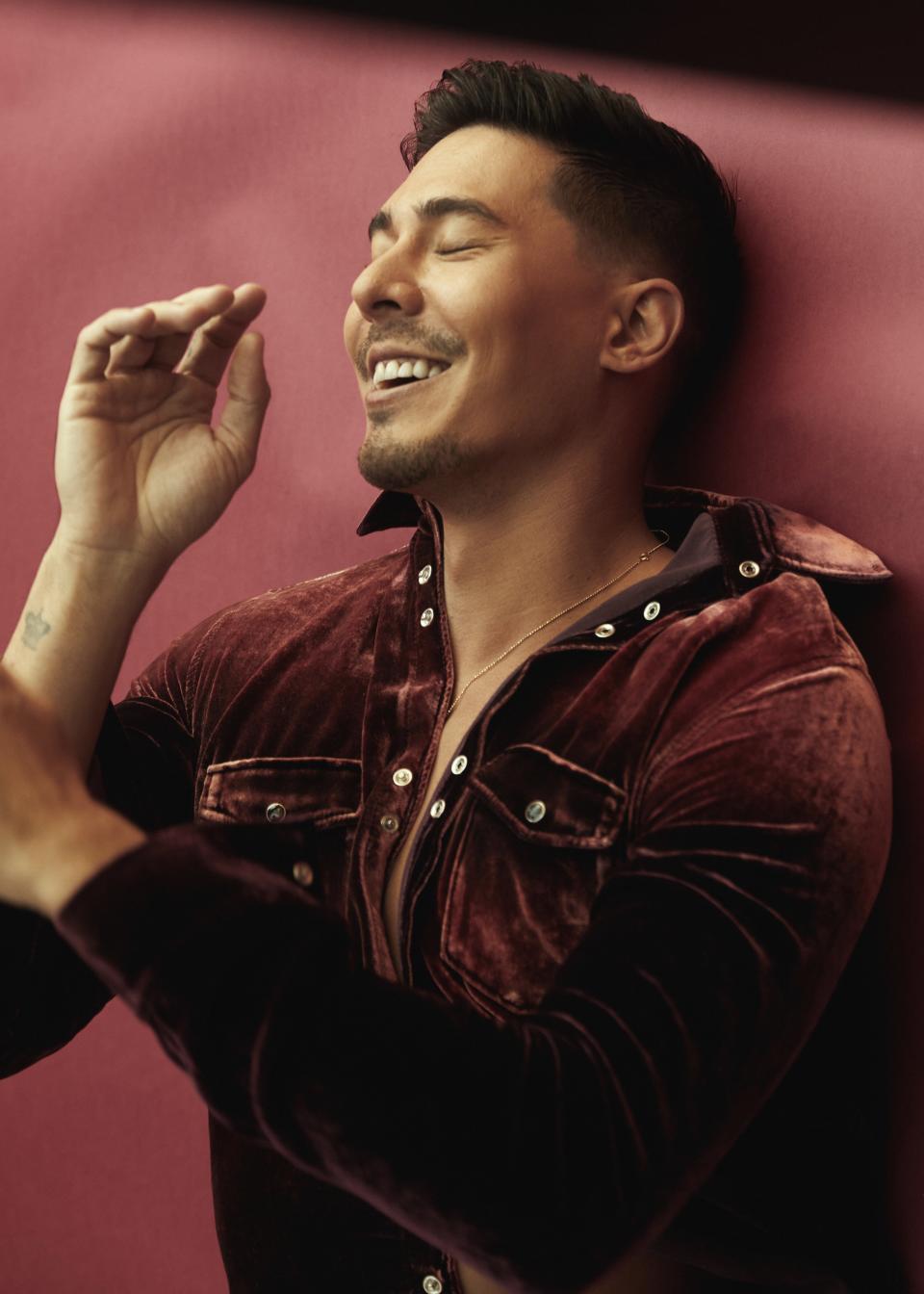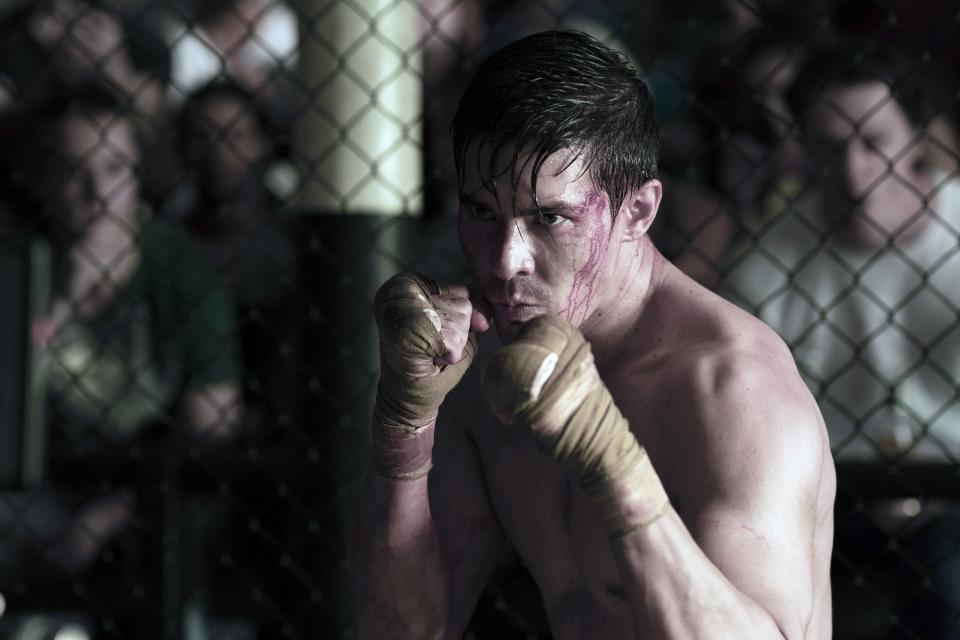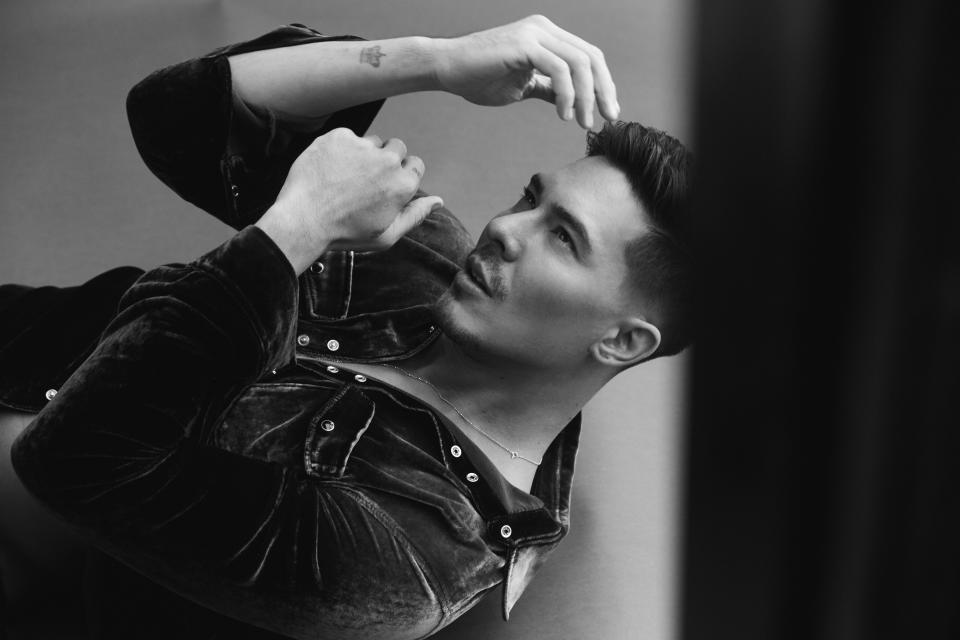Mortal Kombat ’s Lewis Tan Is Proud to Be a Sex Symbol
- Oops!Something went wrong.Please try again later.
- Oops!Something went wrong.Please try again later.
Lewis Tan’s decades of martial arts training has paid off in his acting career. In Mortal Kombat, now in theaters and streaming on HBO Max, he plays an MMA fighter named Cole Young who goes toe to toe with the villainous Sub-Zero (Joe Taslim) while uncovering answers about his heritage. It was an important role for Tan, a British-born actor who is half Chinese and half white. He knows that when it comes to people of color and representation, Hollywood has come a long way—but it still has more strides to make.
With previous roles in series like Netflix’s Wu-Assassins and AMC’s Into the Badlands, the 34-year-old wants to always represent his culture and add authenticity when it comes to infusing martial arts into his work. But there’s more to Tan than just those skills. He’s a champion for diversity and inclusion, which can be seen in all of his work.
Here, Tan speaks to Glamour about his new movie, shares some tidbits about his upbringing, and tells us all about his romantic side for the latest installment of Inappropriate Questions.

Glamour: Your father, Phil Tan, was a very popular stunt coordinator. Did he inspire you to become an actor?
Lewis Tan: He did inspire me in a way. I grew up around film sets. Growing up and seeing these kinds of new worlds and people using their imagination and playing make-believe, I think as a kid that really stays with you. One day I was on a set with pirates, and the next day I’m going to some sort of Indiana Jones–looking thing. I just slowly fell in love with cinema. The older I got, the more I dived in. The more I became obsessed with it, there was no other road.
You managed to work martial arts into your career. How does that affect you—not just creatively, but spiritually as well?
Martial arts is about truth; in essence, it’s about responding truthfully. It’s about feeling out the person in front of you and reacting. The reactions can’t be fake because if they’re fake or they’re misread, then you’re going to end up injured. Martial arts to me is about expression, truthfulness, and flow. I think all those concepts relate to my acting, and it also relates to myself as a man and how I feel spiritually as well. I think that if you can really understand the true nature of martial arts, it really helps you in every area of your life. It could help with confidence and expressing your emotions. It could help with being grounded and feeling present. I think martial arts is a very important thing to learn, and I would suggest that people look into it.
When it comes to your acting career and receiving guidance, has anyone ever tried to talk you out of it?
Not really, but my father warned me about how little we are seeing on screen. He told me that Asian actors were 1.5% of working actors, and that number hasn’t really changed very much over the years. He did warn me that it was going to be an uphill battle and it was going to be very difficult for me. At times he suggested that maybe I don’t use my last name, because it might help me get in the room a little better. He said it might expose me more to different roles. I just wasn’t comfortable with changing that. It was a tough pill to swallow, and for many years he was right. Even now it’s still difficult. I’ve achieved a level of success, but it’s not the same.
Why do you think it’s taken so long for actors of color, particularly Asian actors and creators, to get their shine?
Because Hollywood was predominantly white when it started. And they would even yellow-face white actors in order to play Asian; there was blackface; and Latinos were just nonexistent. I think it started this way, and it took a long time for it to change. Now people are speaking up about it. It was very difficult to get in with the inner circle. Even nowadays, the Academy and the people that are controlling the awards are predominantly white. I think that’s a big part of that business, which does not reflect the real culture, and that's what needs to change. Cinema is about storytelling, and storytelling is about the reflection of the world and holding a mirror to society. For a long period of time, that mirror was a false image. It’s our duty to keep going and keep fighting until we see ourselves correctly portrayed.

MCDMOKO WB003
Warner Bros/Courtesy Everett CollectionMortal Kombat has already surpassed expectations at the box office. What attracted you to the role, especially since it’s a new character in the MK world?
I got to perform authentic martial arts on screen at a very high level with other high-level performers like Joe Taslim and Hiroyuki Sanada, and that was really exciting for me. I feel like I can represent an authenticity level that many actors can’t bring. I also think it was an exciting challenge because I know what I’m up against, with playing a new character in an already beloved franchise with established characters. Normally, if this was 20 years ago, a white character would have been the lead surrounded with people of color.
You’ve carved out a space in martial arts and action. What other genres are you interested in?
I love everything. I want to do romantic films. I want to do indie dramas. I want to do dark comedies, all sorts of different things. I’m a trained actor, and I’m a movie lover. I got my foot in the door through action, and I love action. I want to dominate that genre, for my legacy, my family’s legacy, and for people of color to represent. I’ve also written four screenplays and three of those screenplays got options, and I have my directorial debut coming soon and start pre-production on a film that I wrote about my father’s life and dealing with racism in London and becoming the national champion in martial arts as well as a champion disco dancer in the ’70s.
Wait, your father was a champion disco dancer?
My father was a champion disco dancer. He got invited to Studio 54 by Andy Warhol. He’s one of the first Chinese disco dancing champions.
So does that mean you also know how to dance?
Look, I got rhythm, but I can’t dance like him. He’s on a different level. I know how to move. I’m in tune with my body.
You’ve mentioned you want to do romantic movies, so when people say that you’re a sex symbol, how does that make you feel?
Well, it makes me feel proud because when I was growing up, there weren’t any Asian sex symbols. When I saw myself on a building and I was shirtless on this 100-foot poster, the first thing I thought was, I’ve never seen that before—there’s an Asian guy up there. I think that’s important because a lot of people didn’t grow up feeling confident because they thought the world looked at them a certain way. That is really important to me because we influence the mindset of society as filmmakers, artists, musicians, and writers, so I’m happy to represent in that way. But I get some crazy DMs.
Do tell! What’s the craziest DM you’ve received?
I can’t say it. It can’t be printed. [Laughs.]
Okay, so how about the second craziest?
Just crazy stuff. Like, “I want to have your kids and you don’t even need to be the dad.”
I guess sometimes you just have to shoot your shot?
It’s a bold shot. But after long consideration, I turned the offer down!

Outside of people sliding into your DMs, how hard is it to date being an actor? Does it complicate things?
Yeah, it complicates it in some ways because I’m not in the same place for very long. I can be somewhere for six months, and then I’ll be in a different country for another six months. Sometimes I’m not even home for 80% of the year. You have to date someone who understands the pressure of being an actor and what it takes being in the limelight. Also, the person has to be someone who’s very secure and not jealous, because jealousy starts to cause complications emotionally. If I’m dating someone and they can’t come to see me while I’m filming, then imagine not seeing someone for like three, four months. It’s not like we can talk on the phone every day either because I’m busy filming. Don’t date actors.
Duly noted, Lewis! So what would you say is your love language, or what attracts you?
I’m an Aquarius, and I have moments where I do like a lot of affection and attention, but I also have moments where I need to be alone and by myself and it’s nothing to do with the other person. Then there’s passion.
You have to be genuinely passionate about someone. I think when you’re really passionate and the passion is real, then you have an understanding and a sacrificial kind of love. Love is difficult. It’s tiring. It’s not always glamorous. A lot of people have this misconception about it, but if you really love somebody, you’re going to put yourself in their shoes and try to understand what they want and what they think and how they feel. That to me is very intimate. I want my partner to build me up the same way I want to help them build themselves up. Building each other up is my love language. Not trying to control and building together? That’s beautiful.
Whooo, you’re preaching over here. We’ve talked about a ton of things. But this is probably the most important question: What do you want your legacy to be?
I’d like my legacy to have a long history of good work. Doesn’t matter if it’s television or film or theater or screenplays. I would like to look back on my work and be proud. I would like people to look back on what I did and think it was genuine in that I never changed my intention or my perspective and who I am as a man, but just grew. I think that’s important. If I can accomplish those two things and I can help break boundaries for the future generations, then I’ll be happy.
Yesha Callahan is an award-winning journalist, editorial director, and TV writer based in Los Angeles.
Photographer: Jonny Marlow; stylist: Kyle Kagamida; grooming: Sonia Lee for Exclusive Artists using Kevin Murphy; shirt and jeans: Saint Laurent; shoes: Thursday Boot Company
Originally Appeared on Glamour

